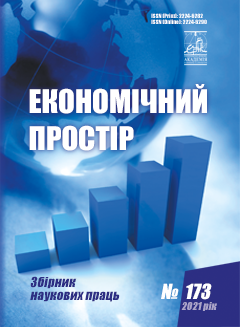TRANSFORMATION OF ECONOMIC RESEARCH METHODS IN THE POST-INDUSTRIAL ERA
Abstract
The article is devoted to the analysis of the directions of transformation of scientific methods of economic cognition in the post-industrial period of social development. It has been determined that the objective social reason for the need for methodological changes in economics is the transition to the digital economy. The use of digital technologies in the economic sector creates a situation of virtualization of production, market and monetary relations. The answer of economics is to improve existing and search for new tools of economic knowledge. The following areas of transformation of economic research methods have been identified by the authors: at first, the rapid development of the mathematical apparatus necessary for the study of economic processes has caused a tendency to mathematize economic research. Second, mathematical modeling becomes the leader among the most used economic methods. Mathematical models in economic research are used extremely widely. They are used to find a specific solution to economic problem, and to conduct an experimental test of the chosen solution, and to forecast trends in the further development of a large economic system or a private enterprise. The third trend is digital technologies, which allow conducting analytical research, tracking any changes in the environment, timely and flexible response to market needs. An example is Data Mining technology, which is a set of different methods of searching and analyzing data to find new, non-trivial, practically useful and interpretable knowledge needed to make decisions in various spheres of human life. Finally, the latest trend is the borrowing of methodological tools from other sciences, both the exact and the humanities. Only under the condition of a multidimensional study of economic reality, it is possible to obtain adequate to reality knowledge. These trends reveal the mathematization of economic methods, the dominant role of modeling in economic cognition, digitalization of economic research and at the same time are the most obvious signs of the transformational state of science during the transition of society to post-industrial level.
References
Басовский Л.Е. История и методология экономической науки : учеб. пособие. 2-е изд., испр. и доп. Москва : ИНФРА-М, 2017. 212 с.
Костюк В.О. Конспект лекций по дисциплине «Методика и организация экономических исследований». Харьков : ХНУГХ им. А.Н. Бекетова, 2017. 86 с.
Полтерович В.М. Кризис экономической теории. Экономическая наука современной России. 1998. № 1. С. 46–66.
Samuelson P.A. The To-Be-Expected Angst Created for Economists by Math-ematics. Eastern Economic Journal. 1994. Vol. 20. № 3. Pp. 267–273. URL: https://www.jstor.org/stable/40325575 (дата звернення: 17.09.2021)
Юревич М.А., Цапенко И.П. Математизация экономической науки в зеркале библиометрии. Terra Economicus. 2016. Т. 14. № 3. С. 16–28.
Юрчук Н.П. Використання економіко-математичних методів в управлінні інноваційним розвитком економічних систем. Інвестиції: практика та досвід. 2015. № 18. С. 28–32.
Бондар О.А. Специфіка моделювання економічних процесів. Економіка та держава. 2013. № 5. С. 67–69.
Методология и методы научных исследований в экономике и менеджменте : пособие для вузов / под ред. Н. Б. Завьяловой, А.Н. Головиной. Москва–Екатеринбург, 2014. 282 с.
Самсонова Н.А. Методология моделирования социально-экономических систем. Вестник ЦЭМИ РАН. 2018. Вып. 4. URL: https://cemi.jes.su/s111111110000000-3-1/ (дата звернення: 30.09.2021).
Болдырев И.А. Экономическая методология сегодня: краткий обзор основных направлений. Журнал Новой экономической ассоциации. 2011. № 9. С. 47–70.
Basovskij L.E. (2017) Istoriya i metodologiya ehkonomicheskoj nauki : ucheb. posobie [History and methodology of economic science: textbook]. Moskva.
Kostyuk V.O. (2017) Konspekt lekcij po discipline «Metodika i organizaciya ehkonomicheskikh issledovanij» [Lecture notes on the discipline "Methodology and organization of economic research"]. Kharkov.
Polterovich V.M. (1998) Krizis ehkonomicheskoj teorii [The crisis of economic theory]. Economic science of modern Russia, no 1, рр. 46–66.
Samuelson P.A. (1994) The To-Be-Expected Angst Created for Economists by Math¬ematics. Eastern Economic Journal, vol. 20, No 3, pp. 267–273. URL : https://www.jstor.org/stable/40325575 (accessed 17.09.2021)
Yurevich M.A., Capenko I.P. (2016) Matematizaciya ehkonomicheskoj nauki v zerkale bibliometrii [Mathematization of Economics in the Mirror of Bibliometrics]. Terra Economicus, vol. 14, no 3, рр. 16–28.
Jurchuk N.P. (2015) Vykorystannja ekonomiko-matematychnykh metodiv v upravlinni innovacijnym rozvytkom ekonomichnykh system [The use of economic and mathematical methods in managing the innovative development of economic systems]. Investments: practice and experience, no 18, рр. 28–32.
Bondar O.A. (2013) Specyfika modeljuvannja ekonomichnykh procesiv [Specifics of modeling economic processes]. Economy and state, no 5, рр. 67–69.
Zav'yalovа N. B., Golovinа A.N. (ed.) (2014) Metodologiya i metody nauchnykh issledovanij v ehkonomike i menedzhmente : posobie dlya vuzov [Methodology and methods of scientific research in economics and management: a guide for universities]. Moskva–Ekaterinburg.
Samsonova N.A. (2018) Metodologiya modelirovaniya social'no-ehkonomicheskikh system [Methodology for modeling socio-economic systems]. Bulletin of CEMI RAS, no 4. URL: https://cemi.jes.su/s111111110000000-3-1/ (accessed 30.09.2021)
Boldyrev I.A. (2011) Ehkonomicheskaya metodologiya segodnya: kratkij obzor osnovnykh napravlenij [Economic methodology today: a brief overview of the main directions]. Journal of the New Economic Association, no 9, рр. 47–70.



